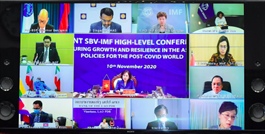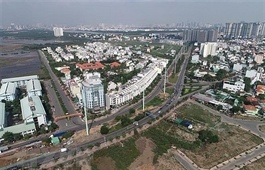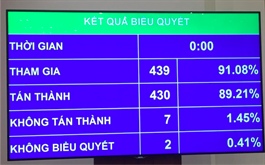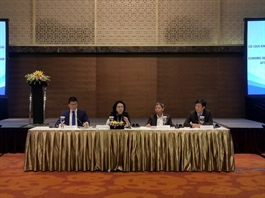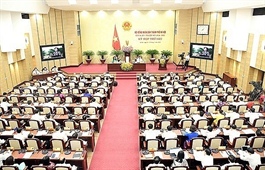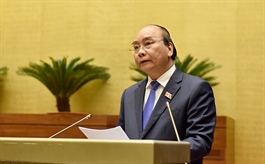Business support packages in the frame for maximum impact
Business support packages in the frame for maximum impact
With many businesses becoming gradually exhausted and in critical need of state support, many National Assembly members have asked the government to apply feasible solutions to lift them out of woes. What will the government do to continue assisting them in the time to come?

Vietnam is looking to ensure its financial injections find their intended destinations, photo Le Toan
|
Never in Vietnam has a government-initiated pro-business policy been complained about as much by enterprises, experts, and National Assembly (NA) members as the VND62 trillion ($2.7 billion) package to support 20 million poor and unemployed people, with major difficulties in disbursement.
This package includes a VND16 trillion ($695.65 million) sum aimed to provide loans for enterprises at a zero lending rate to pay salary for employees. While the package was announced in April, meagre results have been made in disbursement so far because of too many hurdles.
“Amid numerous difficulties, slow-paced implementation of government policies like this package to assist enterprises hit by COVID-19 is leaving many businesses in the lurch, making it hard to boost economic growth,” said NA deputy Luu Binh Nhuong, representing the Mekong Delta province of Ben Tre.
“Though the government has been making big efforts to boost administrative reforms by reducing and removing tens of thousands of administrative procedures and developing an e-government, the public and businesses are still lamenting over difficulties they are facing when conducting business and production. Enterprises are in critical need of state support or the number of enterprises shutting down production will continue rising.”
Stronger policies in need
The General Statistics Office reported that in the first 10 months of 2020, almost 85,600 enterprises halted operations, up 15.1 per cent on-year.
In April, the Vietnam Bank for Social Policies (VBSP), in charge of implementing preferential credit policies for the poor and other policy beneficiaries, offered a VND16 trillion package to struggling enterprises at a 0 per cent lending rate in order to pay salaries for their employees.
However, to obtain the loans, borrowers are required to meet tough conditions. Specifically, an enterprise has to have 20 per cent or at least 30 employees with social insurance who are forced to stop employment during April 1 and December 30. The time of layoff must be at least one continuous month. Besides this, the employer must be facing financial difficulties and cannot pay additional salaries, and must not have any bad debt at credit institutions and foreign banks before December 31, 2019.
If the borrower can meet all of these conditions, he must submit a loan proposal to the district-level people’s committee where the enterprise and the bank’s branch are located. Within three working days, the committee must appraise the proposal and then submit it to the chairperson of the provincial-level people’s committee. Within two working days, the chairperson must issue a decision on the proposal, and send it to the VBSP branch which will process the final procedures to provide the loan for the enterprise.
Commenting on this package, NA deputy Mai Thi Anh Tuyet representing the Mekong Delta province of An Giang said the policy does not seem feasible.
“As far as I know, very few enterprises have been able to obtain loans from it,” Tuyet said. “The VND62 trillion package is too slow to be disbursed.”
Tran Manh Dung, a representative from the People’s Committee of Xuan Dinh ward in Hanoi’s Bac Tu Liem district, told VIR that the locality was given by the city’s government VND5 billion (about $217,400) as part of the VND62 trillion package to support those hit by the pandemic in the locality.
“However, only a few people and no enterprises have been able to access the financial support so far,” Dung said. “It is because there is a lack of specific standards for disbursement. Meanwhile, thousands of residents and hundreds of businesses in the locality want the support.”
It is estimated that about 20 per cent of the whole package has been disbursed nationwide so far.
Nguyen Cong Bang, director of Hanoi foodstuff processor Cong Bang JSC, told VIR that his company used to have 100 employees. “However, the pandemic has hurt our business and we had to lay off 50 workers. Now we want to access the preferential loans, but the conditions are quite complicated and we think we will never be able to approach such a kind of loan,” Bang said. “We have had to resort to loans from other sources to secure our business.”
According to many NA deputies like Tuyet, the government needs to review all pro-business policies it has already enacted so that practical and feasible solutions can be taken to lift enterprises out of their problems.
“It is strongly recommended that the government review how the VND62 trillion package has been implemented. Under the reports we have, the implementation of the package is too slow, while too many enterprises are suffering from difficulties and need urgent support. All of them are small- and medium-sized enterprises, and they are the key driving force for job creation and economic growth,” said NA deputy Cao Dinh Thuong, representing the northern province of Phu Tho.
Thuong cited a survey from the Vietnam Chamber of Commerce and Industry stating that as of mid-September, about 3 per cent of the surveyed enterprises received loans from the package. “What is the cause? Is it the lack of responsibility of those in charge of disbursement of the package?” Thuong wondered.
According to NA members, direct financial support is just a situational solution, and in the long term the government should have sturdier solutions. “There must be special policies to help enterprises to spur on demand. If there is no breakthrough in administrative reform, the pro-business policies in 2021 will likely not help enterprises reduce costs and also impede their development and recovery,” Thuong said. “This will badly affect the country’s 2021-2025 Socioeconomic Development Plan.”
Since the second quarter of 2020, the government has also been deploying some drastic measures to support businesses. For instance, the State Bank of Vietnam has been deploying a package worth VND180 trillion ($7.82 billion) for enterprises and households, in the form of debt payment deferral and preferential loans.
However, no concrete reports on how this huge package has been carried out have been revealed.
The World Bank recently published results of a survey of around 500 businesses in Vietnam, asking how they have been affected by COVID-19. Firm revenues reduced substantially and despite the easing of social distancing rules, 85 per cent of firms still reported a reduction in sales by June. Over 50 per cent of respondents reported having their operations affected by a decrease in input availability.
This shock affected firms in the manufacturing and wholesale and retail sectors similarly. On average, firms are expecting highly negative growth over the next six months of -27 per cent for sales and -20 per cent for employment.
Breathing new life
Assigned by the government, the Ministry of Planning and Investment (MPI) is asking ministries and agencies to provide it with policy recommendations for the second economic stimulus package expected to be offered by the government in the time to come. Besides policies for labourers, this package will likely have a major focus on assisting firms operating in the sectors of aviation, tourism, and consumption services.
One of the notable policies in this package is that the MPI may ask the government to guarantee loans worth about VND11 trillion ($478.26 million) for aviation businesses.
“COVID-19 has caused a massive reduction in revenues of aviation firms and this may lead to insolvency and then bankruptcy,” said MPI Deputy Minister Tran Quoc Phuong. “Without special policies, the aftermath would be extremely negative. This policy is expected to be a kiss of life for firms.”
Moreover, the MPI also proposes a reduction of 70 per cent of environmental protection tax for aircraft fuel for 2021. However, some NA deputies have different angles at the new possible package.
Do Van Sinh, member of the National Assembly Economic Committee, told VIR that a new economic stimulus package is “quite necessary given enterprises face massive complications.”
However, he said, in order for the package to be materialised, it is necessary to have a close look at the current state budget situation, as revenue is expected to be VND1.32 quadrillion ($57.52 billion), down 14.7 per cent on-year.
“Thus, if another economic stimulus package is enacted, how much will it be, especially given the numerous issues with the state budget? I think it is necessary now to first effectively carry out the existing packages,” Sinh said.
Meanwhile NA deputy Truong Minh Hoang, representing the southernmost province of Ca Mau, also told VIR, “It is quite necessary to have a new economic stimulus package to further support enterprises. However, before implementing this initiative, it is necessary to consider the existing state budget situation, which is expected to see a big budget deficit this year.”
“Thorough studies must be made so as to decide on what sectors and who will benefit from the new package,” he said. “It is urgent now to provide more support to businesses.”









